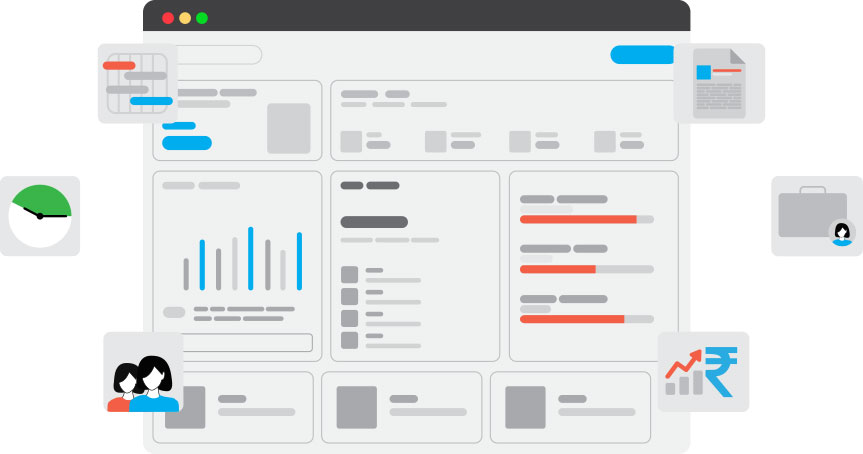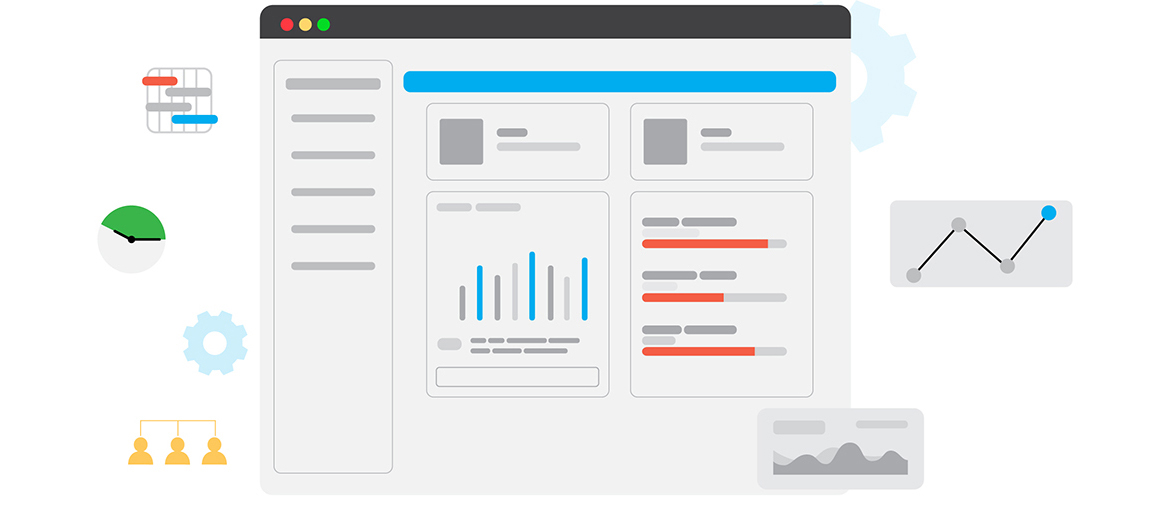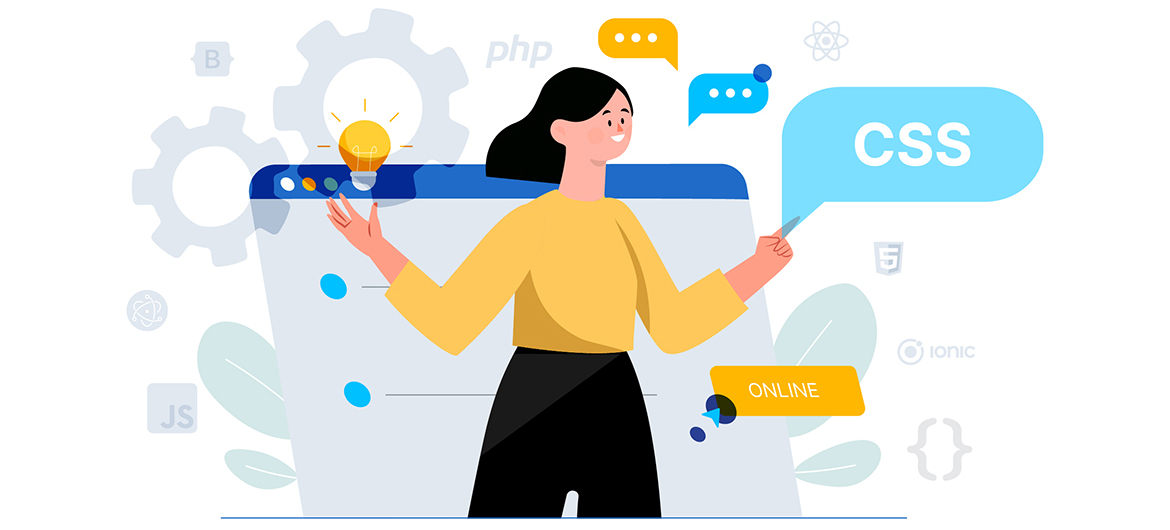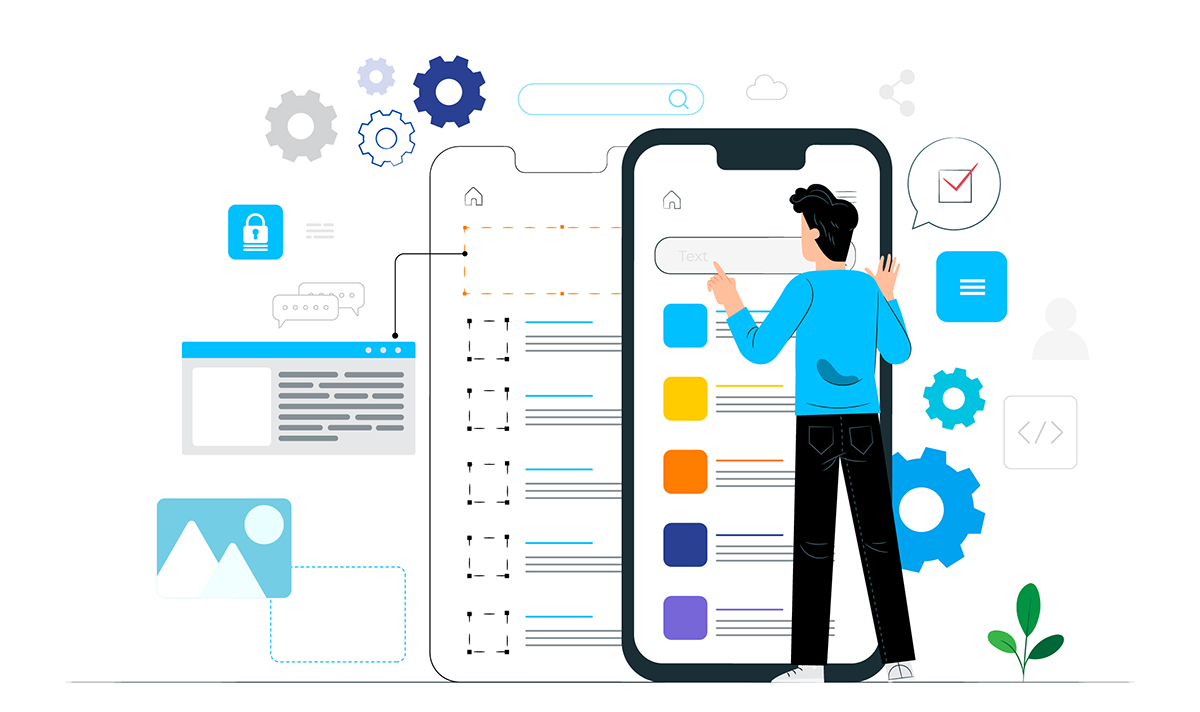Every business requires a high level of workflow and automation to run its business smoothly. All these activities can be performed easily with the help of customized enterprise applications. With this companies can achieve smooth supply chains, improves customer services, enhance their day-to-day work of employees, revise the business process, analyze large amounts of data, and accomplish so many other tasks.
A wide range of businesses is already looking for their own enterprise digital solutions based on the latest trends. We are among the ones who will create fully customized enterprise apps that run on mobile devices and web platforms.
In this article, we’ll look into a variety of enterprise mobile apps and web platforms, how they can benefit your business, and how long it takes to build one.

What Is Enterprise App Development?
The term “enterprise app development” is self-explanatory. This implies the development of enterprise-level apps that runs on each and every device. So, what are “enterprise-level apps”? Enterprise-level apps are the applications that will be developed for the management and smooth functioning of business processes in a company. Enterprise App performs various tasks and is able to generate dynamic reports which can be presented during a business meeting to achieve functional business goals.
For example, they can:
- automate most of the tasks in production processes, i.e., send documents through mail
- provide data access based on the user roles and permission of each employee in the company,
- improves communication and data exchange within employees and departments,
- provides data analysis on the fingertip and reporting of the data,
- performs customer and supplier relationship management processes, etc.
This way, with the help of enterprise apps all employees are able to access the company’s data based on their roles, through which they can control and manage the company’s workflows using their desktop, laptop, or mobile devices.
Types of Enterprise Applications
There is a wide variety of enterprise apps available in the market but that can’t be adjusted to your company’s business model. All the apps can be divided into three categories: employees, departments, and company levels.
Employee-level enterprise apps are task-focused apps created for solving issues related to a certain position in the company. This type of application provides employees-related activities such as attendance monitoring, and task management with synchronized data. Also, it sends a company’s necessary information/feedback to all or selected employees, using in-app notifications. Some examples of employee level apps include:
- order process management software with the help of that anyone can quickly retrieve all the necessary information of a customer, sales-related data;
- messaging feature in the app is useful for quick communication between team members for any project related updates;
- business analytics apps will be useful for project managers to track the project progress, its relevant data, and KPIs;
- supply-chain and logistics enterprise apps are very useful for orders and shipments tracking with material requirement plans, and so many others.
Department-level enterprise apps improve the workflow of certain company processes within departments. There are so many department-level apps available, which include:
- project management tools for sending group/personal messages and establishing team goals and objectives;
- ticket systems for tech support;
- marketing management apps for market analysis, launching marketing campaigns, resource management, and others;
- accounting apps for financial operations and transactions;
- HR management tools for employees’ data management and their feedback collection, and others.
Department-level applications can include third-party applications also which will be synchronizing data across organizations and other industry specialized applications suitable for different business needs like e-commerce apps, banking and finance, IoT, and others.
Company-level enterprise apps are aimed at establishing stable communication between departments – an integrated network where each employee can reach their executives or colleagues across the departments. These apps can include:
- apps for corporate training which provide learning opportunities inside a company;
- communication apps for an entire company;
- general productivity apps for monitoring and planning company-level activities.

Benefits of Enterprise Applications
When opting for customized enterprise application development, companies can add in the features essential for their successful business development. Here are some examples of how your business can benefit from enterprise applications.
1.Structured data
Even a small company has to handle large amounts of data from various sources like departments, customers, suppliers, etc. Enterprise applications help businesses to quickly structure and process the data efficiently, effectively dividing it within departments and team members and making it simple to access available data for each employee.
2.High-security level
Enterprise apps provide all employees with simple role-based access. This feature ensures that each worker and manager will get access only to the data they are allowed to by settings some parameters. Therefore, non-authorized users can’t retrieve important data from the company’s databases. Moreover, these apps can have special configurations for the company’s customers or business partners.
3.Simple update on the latest changes
All employees will receive a quick update on the latest news of the company’s activities. Along with that, there are so many features available such as sharing documents, messaging with each other, group messages, etc. without using third-party services and preventing any possible data leaks.
4.Payments, accounting, and transactions
Many software development companies are giving smart features to integrate their app with e-Commerce platforms, payment gateway, or other FinTech companies for enhancing their business process in the company.
5.Employees management
With the help of enterprise apps, management can monitor their employees’ workload and/or progress, and perform employee-related activities such as attendance, leave application, view payslip, salary disbursement information, etc.
6.Supply chain management
Supply chain management will be a valuable factor for the manufacturers who have to order materials from their vendors to produce finished goods. With the supply chain management feature they can plan, deliver, and manage the raw materials, semi-finished goods, and/or transportation. This feature will allow them to track the materials supply, resulting in better and controlled budget allocation.
7.Customer support
Support is the main key factor for any software development company. We at ENLIVEN are always available to hear from you, in case of any query we are ready to serve you round the clock.

How Long Does It Take to Develop an Enterprise Mobile Application?
Enterprise application development is usually a time-consuming process. Even though there are a variety of factors that strongly influence the time frame. Which includes:
- the complexity of the project and the number of features you want to include in your digital transformation;
- functionality and productivity of the tech stack;
- expertise and experience of the app developers;
- project deadlines and the planned budget.
When estimating project time, everyone needs to consider 5 main stages to build an effective enterprise app.
1.Planning Stage
The planning stage is a very important stage that defines the app idea, determining its scope of work and end-users as well. Also, it involves selecting a platform to develop such an app and selecting developers from the development team.
2.Design & Prototyping Stage
App design and prototyping involve building a blueprint of the app to test the idea. Building a prototype helps businesses to save valuable time and budget. Enterprise app developers create a sample with all functionality and check whether this prototype is consistent with the business needs.
3.Development Stage
The development stage is the longest part when app developers do most of the work like building the app’s front-end and back-end layers, APIs, adjusting and connecting the app to various services, etc.
4.Testing Stage
At the testing stage, the QA team ensures that the app works properly and doesn’t include any bugs and if it’s safe to store and share data among the organization.
5.Release & Maintenance Stage
App release and maintenance involve launching the app and testing it with its end users. The project team gathers feedback from the end-users to understand what are improvements required in the developed app.
Our Expertise in Building Mobile Enterprise Apps
ENLIVEN development team has participated in several enterprise development projects. Here are some examples on which our team has recently worked.
Our team had to develop a reliable and high-speed application for managing manufacturing activities. For this, our team performed an in-depth analysis to understand which features are required to include so that proper outcomes will be achieved and add maximum value to the customer’s business.
With the customers’ requirements in mind, the ENLIVEN team has added to the app the following features:
- develop industry-specific HMI;
- data processing and syncing across all the devices;
- data storage;
- auto-scheduler to run planning engine smoothly;
- dynamic reports generation in various formats;
- barcodes and QR codes reading;
- automated SMS/Email;
- adaptable business logic and customizable workflow.
As a result, the ENLIVEN team developed a highly customizable enterprise application that meets all the customer’s requirements. Our customer was satisfied with the result as our team managed to develop a highly effective digital transformation solution within the estimated time frame.
Conclusion on Enterprise Mobile App Development
Building an enterprise app will give a great boost to your business development. These apps will help companies to process and analyze the data accurately, they will receive daily updates from various channels, improve their customer service experience and supply chains process, performs payments and accounting, and so on.
We, at ENLIVEN, will be happy to participate in the development of your app and bring your creative vision to life. Feel free to contact us.
